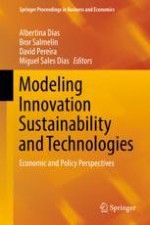2018 | OriginalPaper | Buchkapitel
Absorptive Capacity of R&D in Space: A Conceptual Approach to the Productivity Paradox
verfasst von : Mário A. P. M. Da Silva, Peter Nijkamp
Erschienen in: Modeling Innovation Sustainability and Technologies
Aktivieren Sie unsere intelligente Suche, um passende Fachinhalte oder Patente zu finden.
Wählen Sie Textabschnitte aus um mit Künstlicher Intelligenz passenden Patente zu finden. powered by
Markieren Sie Textabschnitte, um KI-gestützt weitere passende Inhalte zu finden. powered by
